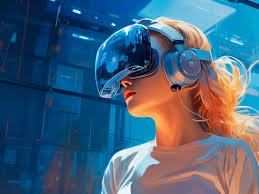In the rapidly evolving landscape of technology, virtual reality (VR) has emerged as a transformative force, reshaping how we interact with digital content and experience the world around us. From gaming and education to healthcare and real estate, VR application development is paving the way for innovative solutions that enhance user engagement and interaction. This article delves into the essential aspect of virtual reality application development, its applications acros various industries, and the future prospect of VR development.
Understanding Virtual Reality
Virtual reality refer to a computer-generated simulation that immerses users in a three-dimensional environment. By using specific equipment like VR headsets, individuals are able to navigate through virtual environments, interact with digital items, and participate in simulations that imitate real life. In contrast to traditional media that simply delivers content to audiences, VR provides an interactive experience that enables users to become part of the story.
The Importance of VR Development
As businesses increasingly recognize the potential of VR, the demand for skilled developers in this field is on the rise. Virtual reality application development involves creating software that provides immersive experiences tailored to specific user needs. This development process requires a combination of creativity, technical expertise, and an understanding of user experience (UX) design.
Key Components of VR Application Development
Hardware Selection: The first step in VR development is selecting the appropriate hardware. There are various VR devices on the market, including Oculus Rift, HTC Vive, and PlayStation VR. Every device come with it own distinct characteristics, and developers need to take into account elements such as target demographic and intended purpose before selecting one.
Software Development Kits (SDKs): VR development relies on specialized software tools that enable developers to create immersive experiences. SDKs like Unity and Unreal Engine provide developers with the necessary resources to design, build, and test VR applications efficiently.
User Experience Design: Designing a user-friendly interface is crucial in VR application development. The immersive nature of VR means that users interact with the environment in unique ways. Therefore, developers must consider factors such as motion controls, spatial awareness, and comfort to create seamless experiences.
Content Creation: Engaging content is the heart of any successful VR application. Whether it’s 3D models, animations, or audio, high-quality content enhances the overall experience and keeps users engaged. Collaborating with artists, animators, and sound designers can significantly elevate the quality of the final product.
Applications of Virtual Reality
The versatility of virtual reality allows it to be applied across various industries, each benefiting from its unique features.
- Gaming
The gaming industry has been at the forefront of VR development, offering players immersive experiences that transport them into fantastical worlds. VR gaming enables players to physically interact with the game environment, making gameplay more engaging and realistic. Titles like “Beat Saber” and “Half-Life: Alyx” exemplify how VR can elevate the gaming experience, drawing players into rich narratives and interactive challenges. - Education and Training
VR has revolutionized the education sector by providing immersive learning experiences. Virtual reality applications can simulate real-world scenarios, allowing students to practice skills in a safe environment. For instance, medical students can perform virtual surgeries, while aviation trainees can experience flight simulations. This hands-on approach enhances learning retention and prepares individuals for real-life challenges. - Healthcare
In healthcare, VR applications are being used for therapeutic purposes, pain management, and rehabilitation. Virtual reality can distract patients from pain during medical procedures or help individuals overcome phobias through exposure therapy. Additionally, therapists can use VR to create customized treatment plans for patients, enhancing their recovery process. - Real Estate
Real estate agents are leveraging virtual reality to provide potential buyers with immersive property tours. VR applications allow clients to explore homes remotely, giving them a realistic feel for the space without needing a physical visit. This technology streamline the buying process and enhances the overall customer experience. - Tourism and Travel
Virtual reality is changing how we experience travel and tourism. VR applications can transport users to iconic destinations, allowing them to explore new places from the comfort of their homes. This technology is particularly beneficial for individual who may have mobility limitations or cannot travel due to various reasons.
The Future of Virtual Reality Application Development
As technology continues to advance, the future of virtual reality application development looks promising. Here are some trends that may shape the VR landscape in the coming years:
- Increased Accessibility
With the rise of affordable VR headsets and mobile VR solutions, more users will have access to virtual reality experiences. As the technology becomes mainstream, developers will need to create applications that cater to diverse audiences, including those with varying levels of technical proficiency. - Enhanced Interactivity
Future VR applications are likely to offer even more interactive experience. Advancements in motion tracking and haptic feedback will allow users to engage with virtual environments more intuitively. This evolution will enable developers to create more complex and immersive scenarios, enhancing user satisfaction. - Integration of AI and Machine Learning
The integration of artificial intelligence (AI) and machine learning into VR applications will enable personalized experiences. By analyzing user behavior and preferences, developer can create tailored content that adapts to individual needs, making virtual reality even more engaging and relevant. - Expansion into New Industries
As awareness of VR technology grows, more industries are likely to explore its applications. Fields such as architecture, retail, and marketing are beginning to experiment with VR solution, offering unique experiences to their customers. This expansion presents new opportunities for VR developers to innovate and create cutting-edge applications. - Social VR Experiences
The future of virtual reality may also see a surge in social VR applications that facilitate interactions among users in virtual space. These applications can enable users to connect, collaborate, and socialize, creating shared experiences that transcend geographical boundaries. As remote work and social distancing become more common, social VR may play a crucial role in fostering connections.
Conclusion
The field of virtual reality application development is continuously changing and progressing, offering the opportunity to transform our digital content interaction experience. From gaming to education, healthcare, and real estate, VR has a wide range of applications. With technology constantly evolving, developers can create new, engaging solutions to elevate user experiences to a higher level.
Looking ahead, there will be a growing need for talented VR developers, offering promising career prospects in this flourishing field. Developer can have a significant impact on the future of virtual reality by following effective design principles and staying informed on new trends.




